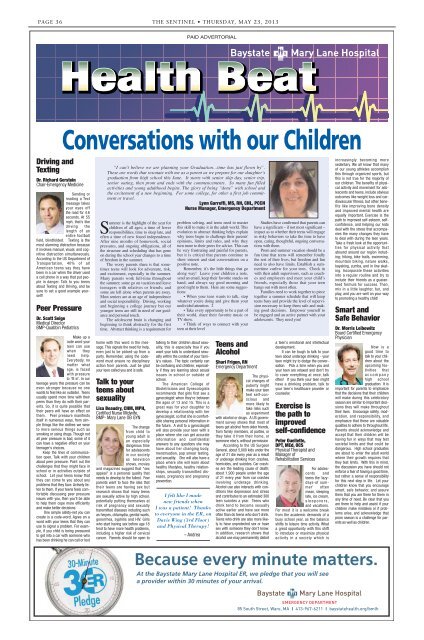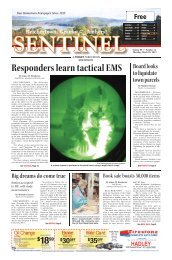May 23, 2013 PDF Edition - The Sentinel
May 23, 2013 PDF Edition - The Sentinel
May 23, 2013 PDF Edition - The Sentinel
Create successful ePaper yourself
Turn your PDF publications into a flip-book with our unique Google optimized e-Paper software.
PAGE 36<br />
THE SENTINEL • THURSDAY, MAY <strong>23</strong>, <strong>2013</strong><br />
PAID ADVERTORIAL<br />
Health Beat<br />
Conversations with our Children<br />
Driving and<br />
Texting<br />
Dr. Richard Gerstein<br />
Chair-Emergency Medicine<br />
Sending or<br />
reading a Text<br />
message takes<br />
your eyes off<br />
the road for 4.6<br />
seconds. At 55<br />
mph, that's like<br />
driving the<br />
length of an<br />
entire football<br />
field, blindfolded. Texting is the<br />
most alarming distraction because<br />
it involves manual, visual, and cognitive<br />
distraction simultaneously.<br />
According to the US Department of<br />
Transportation, 40% of all<br />
American teens say they have<br />
been in a car when the driver used<br />
a cell phone in a way that put people<br />
in danger. Talk to you teens<br />
about Texting and Driving, and be<br />
sure to set a good example yourself!<br />
Peer Pressure<br />
Dr. Scott Seige<br />
Medical Director<br />
BMP-Quabbin Pediatrics<br />
Make up a<br />
code word your<br />
teen can use<br />
when they<br />
need help.<br />
Everybody, no<br />
matter what<br />
age, is faced<br />
with pressure<br />
to 'fit in'. In our<br />
teenage years this pressure can be<br />
even stronger because no one<br />
wants to feel like an outsider. Teens<br />
usually spend more time with their<br />
peers than they do with their parents.<br />
So, it is quite possible that<br />
their peers will have an effect on<br />
them. Peer pressure manifests<br />
itself in numerous ways, from simple<br />
things like the clothes we wear<br />
to more serious things such as<br />
smoking or using drugs. Though not<br />
all peer pressure is bad, some of it<br />
can have a negative effect on your<br />
teenager's choices.<br />
Keep the lines of communication<br />
open. Talk with your children<br />
about peer pressure. Point out the<br />
challenges that they might face in<br />
school or in activities outside of<br />
school. Let your teens know that<br />
they can come to you about any<br />
problems that they face. Actively listen<br />
to them. If your teens feels comfortable<br />
discussing peer pressure<br />
issues with you, then you'll be able<br />
to help them cope more efficiently<br />
and make better decisions.<br />
One simple safety-net you can<br />
create is a code-word. Agree on a<br />
word with your teens that they can<br />
use to signal a problem. For example,<br />
if you child is being pressured<br />
to get into a car with someone who<br />
has been drinking he can call or text<br />
S<br />
“I can’t believe we are planning your Graduation…time has just flown by”.<br />
<strong>The</strong>se are words that resonate with me as a parent as we prepare for our daughter’s<br />
graduation from high school this June. It starts with senior skip day, senior trip,<br />
senior outing, then prom and ends with the commencements. So many fun filled<br />
activities and young adulthood begins. <strong>The</strong> glory of being “done” with school and<br />
the excitement of a new beginning. For some college, for other a first job commitment<br />
or travel.<br />
Lynn Garreffi, MS, RN, CNL, PCCN<br />
Nurse Manager, Emergency Department<br />
ummer is the highlight of the year for<br />
children of all ages; a time of fewer<br />
responsibilities, time to sleep late, and<br />
often a time of new found independence.<br />
After nine months of homework, social<br />
pressures, and ongoing obligations, all of<br />
the structure and scheduling that has gone<br />
on during the school year changes to a time<br />
of freedom in the summer.<br />
<strong>The</strong> worry parents share is that sometimes<br />
teens will look for adventure, risk,<br />
and excitement, especially in the summer.<br />
Many parents work full-time throughout<br />
the summer; some go on vacation and leave<br />
teenagers with relatives or friends; and<br />
some are left alone when parents are away.<br />
Most seniors are at an age of independence<br />
and social responsibility. Driving, working<br />
and beginning a college journey but our<br />
younger teens are still in need of our guidance<br />
and personal touch.<br />
<strong>The</strong> adolescent brain is changing and<br />
beginning to think abstractly for the first<br />
time. Abstract thinking is a requirement for<br />
home with this word in the message.<br />
This signals the need for help,<br />
even just to be picked-up from a<br />
party. Remember, using the codeword<br />
must ensure no disciplinary<br />
action from parents. Just be glad<br />
your teen called you and is safe.<br />
Talk to your<br />
teens about<br />
sexuality<br />
Lisa Beaudry, CNM, MPH,<br />
Certified Nurse Midwife,<br />
BMP- Mary Lane OB GYN<br />
<strong>The</strong> change<br />
from child to<br />
young adult is<br />
an especially<br />
dangerous time<br />
for adolescents<br />
in our society<br />
as television<br />
shows, movies<br />
and magazines suggest that "sex<br />
appeal" is a personal quality that<br />
needs to develop to the fullest. Few<br />
parents want to face the idea that<br />
their teens are having sex but<br />
research shows that many teens<br />
are sexually active by high school,<br />
potentially putting themselves at<br />
risk of pregnancy and sexually<br />
transmitted diseases including such<br />
as herpes, chlamydia, genital warts,<br />
gonorrhea, syphilis and HIV. Girls<br />
who start having sex before age 18<br />
tend to have more health problems,<br />
including a higher risk of cervical<br />
cancer. Parents should be open to<br />
problem solving, and teens need to master<br />
this skill to make it in the adult world. This<br />
evolution to abstract thinking helps explain<br />
why teens begin to challenge their parents'<br />
opinions, limits and rules, and why they<br />
turn more to their peers for advice. This can<br />
be very frustrating and painful for parents,<br />
but it is critical that parents continue to<br />
show interest and start conversations on a<br />
positive note.<br />
Remember, it’s the little things that go<br />
along way! Leave your children a note,<br />
send an email, keep their favorite snacks on<br />
hand, and always say good morning and<br />
good night to them. Here are some suggestions:<br />
• When your teen wants to talk, stop<br />
whatever you're doing and give them your<br />
undivided attention. 2<br />
• Take every opportunity to be a part of<br />
their world, share their favorite music or<br />
TV show.<br />
• Think of ways to connect with your<br />
teen at their level<br />
talking to their children about sexuality,<br />
this is especially true if you<br />
want your kids to understand sexuality<br />
within the context of your family's<br />
values. <strong>The</strong> topic certainly can<br />
be confusing and children, especially<br />
if they are learning about sexual<br />
issues in school or outside of<br />
school.<br />
<strong>The</strong> American College of<br />
Obstetricians and Gynecologists<br />
recommends that girls first see a<br />
gynecologist when they're between<br />
the ages of 13 and 15. This is a<br />
great way for your daughter to<br />
develop a relationship with her<br />
gynecologist, so that she is comfortable<br />
sharing personal information in<br />
the future. A visit to a gynecologist<br />
will also provide your teen with a<br />
place where she can get accurate<br />
information and confidential<br />
answers to any questions she may<br />
have about her changing body,<br />
menstruation, pap smear testing,<br />
and sexuality. She will also have a<br />
place where she will learn about<br />
healthy lifestyles, healthy relationships,<br />
sexually transmitted diseases,<br />
pregnancy and pregnancy<br />
prevention.<br />
I felt like I made<br />
new friends when<br />
I was a patient! Thanks<br />
to everyone in the ER, on<br />
Davis Wing (3rd Floor)<br />
and Physical <strong>The</strong>rapy!<br />
– Andrea<br />
Teens and<br />
Alcohol<br />
Shari Frigon, RN<br />
Emergency Department<br />
<strong>The</strong> physical<br />
changes of<br />
puberty might<br />
make your teen<br />
feel self-conscious<br />
and<br />
more likely to<br />
take risks such<br />
as experiment<br />
with alcohol or drugs. A US government<br />
survey shows that most of<br />
teens get alcohol from older friends,<br />
from family members, at parties, or<br />
they take it from their home, or<br />
someone else’s, without permission<br />
According to the US Surgeon<br />
General, about 5,000 kids under the<br />
age of 21 die every year as a result<br />
of underage drinking from crashes,<br />
homicides, and suicides. Car crashes<br />
are the leading cause of death;<br />
about 1,900 people under the age<br />
of 21 every year from car crashes<br />
involving underage drinking.<br />
Alcohol use also interacts with conditions<br />
like depression and stress<br />
and contributes to an estimated 300<br />
teen suicides a year. Teens who<br />
drink tend to become sexually<br />
active earlier and have sex more<br />
often than do teens who don't drink.<br />
Teens who drink are also more likely<br />
to have unprotected sex or have<br />
sex with someone they don’t know.<br />
In addition, research shows that<br />
alcohol use may permanently distort<br />
Studies have confirmed that parents can<br />
have a significant – if not most significant –<br />
impact as to whether their teens will engage<br />
in risky behaviors so take the time to have<br />
open, caring, thoughtful, ongoing conversations<br />
with them.<br />
Prom and summer vacation should be a<br />
fun time that teens will remember fondly<br />
the rest of their lives, but freedom and fun<br />
need to also have limits. Establish a summertime<br />
curfew for your teen. Check in<br />
with their adult supervisors, such as coaches<br />
and employers and meet your child’s<br />
friends, especially those that your teen<br />
hangs out with most often.<br />
Families need to work together to piece<br />
together a summer schedule that will keep<br />
teens busy and provide the level of supervision<br />
necessary to keep them safe and making<br />
good decisions. Empower yourself to<br />
be engaged and an active partner with your<br />
adolescents. <strong>The</strong>y need you!<br />
a teen's emotional and intellectual<br />
development.<br />
It can be tough to talk to your<br />
teen about underage drinking - your<br />
teen might try to dodge the conversation.<br />
Pick a time when you and<br />
your teen are relaxed and don’t try<br />
to cover everything at once, talk<br />
often! If you think your teen might<br />
have a drinking problem, talk to<br />
your teen's healthcare provider or<br />
counselor.<br />
Exercise is<br />
the path to<br />
improved<br />
self-confidence<br />
Peter Ouellette,<br />
DPT, MEd, OCS<br />
Physical <strong>The</strong>rapist and<br />
Manager of<br />
Rehabilitation Services<br />
For adolescents<br />
and<br />
teens the ‘lazydays-of<br />
summer’<br />
often<br />
mean, sleeping<br />
late, ice cream,<br />
sleepovers,<br />
and vacations.<br />
For most it is a welcome break<br />
from the academic demands of a<br />
busy school year, as the balance<br />
shifts to leisure time activity. What<br />
a great opportunity with this shift<br />
to introduce or maximize physical<br />
activity in a society which is<br />
Because every minute matters.<br />
At the Baystate Mary Lane Hospital ER, we pledge that you will see<br />
a provider within 30 minutes of your arrival.<br />
increasingly becoming more<br />
sedentary. We all know that many<br />
of our young athletes accomplish<br />
this through organized sports, but<br />
this is not true for the majority of<br />
our children. <strong>The</strong> benefits of physical<br />
activity and movement for adolescents<br />
and teens, include obvious<br />
outcomes like weight loss and cardiovascular<br />
fitness, but other benefits<br />
like improving bone density<br />
and improved mental health are<br />
equally important. Exercise is the<br />
path to improved self-esteem, selfconfidence,<br />
and helping our kids<br />
deal with the stress that accompanies<br />
the many changes they have<br />
to deal with during the teen years.<br />
Take a fresh look at the opportunities<br />
for physical activity that<br />
abound around our region including;<br />
hiking, bike trails, swimming,<br />
mountain biking, nature walks,<br />
kayaking, zumba, and in line skating.<br />
Incorporate these activities<br />
into a regular routine and try to<br />
include their friends as a guaranteed<br />
formula for success. <strong>The</strong>n,<br />
mix in a little laughter, fun, and<br />
play, and you are well on your way<br />
to promoting a healthy child!<br />
Smart and<br />
Safe Behavior<br />
Dr. Morris Leibowitz<br />
Board Certified Emergency<br />
Physician<br />
Now is a<br />
good time to<br />
talk to your children<br />
about the<br />
upcoming festivities<br />
that<br />
accompany<br />
high school<br />
graduation. It is<br />
important for parents to emphasize<br />
that the decisions that their children<br />
will make during this celebratory<br />
season are similar to important decisions<br />
they will make throughout<br />
their lives. Encourage safety, moderation,<br />
and responsibility, and<br />
emphasize that these are valuable<br />
qualities to adhere to throughout life.<br />
Parents should acknowledge and<br />
accept that their children will be<br />
having fun in ways that may test<br />
societal limits and that could be<br />
dangerous. High school graduates<br />
are about to enter the adult world<br />
where their growth requires that<br />
they test limits. With this in mind,<br />
the discussion you have should not<br />
enforce a fear of having a good time,<br />
but rather a sense of responsibility<br />
for this next step in life. Let your<br />
children know that you encourage<br />
smart, safe behavior, and assure<br />
them that you are there for them in<br />
any time of need. Be clear that you<br />
are there to help and assist if your<br />
children make mistakes or if problems<br />
arise, and acknowledge that<br />
prom season is a challenge for parents<br />
as well as children.<br />
EMERGENCY DEPARTMENT<br />
85 South Street, Ware, MA 413-967-6211 baystatehealth.org/bmlh
















